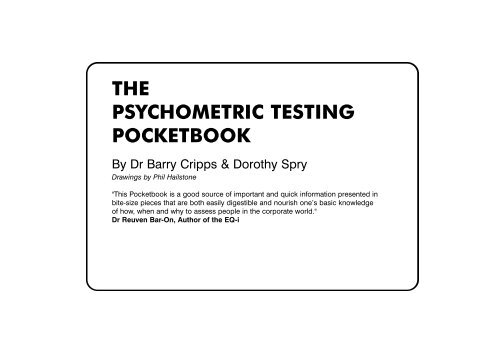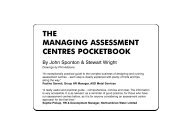the psychometric testing pocketbook - Management Pocketbooks
the psychometric testing pocketbook - Management Pocketbooks
the psychometric testing pocketbook - Management Pocketbooks
Create successful ePaper yourself
Turn your PDF publications into a flip-book with our unique Google optimized e-Paper software.
THE<br />
PSYCHOMETRIC TESTING<br />
POCKETBOOK<br />
By Dr Barry Cripps & Dorothy Spry<br />
Drawings by Phil Hailstone<br />
"This Pocketbook is a good source of important and quick information presented in<br />
bite-size pieces that are both easily digestible and nourish one’s basic knowledge<br />
of how, when and why to assess people in <strong>the</strong> corporate world."<br />
Dr Reuven Bar-On, Author of <strong>the</strong> EQ-i
INTRODUCTION 5<br />
Aims of <strong>pocketbook</strong>, benefits to <strong>the</strong><br />
organisation, definition, what makes a<br />
good test, selecting <strong>the</strong> right one,<br />
necessary ingredients, good practice<br />
TESTING FOR SELECTION 15<br />
Why use selection tests, intelligence<br />
<strong>testing</strong>, golden triangle, case studies<br />
for ability tests (GAT 2), aptitude (CPAB),<br />
critical reasoning (W-GCTA UK ),<br />
personality (16PF ® 5) and work style<br />
(Thomas International System PPA)<br />
TESTING FOR 47<br />
ORGANISATIONAL DEVELOPMENT<br />
Definitions of OD and EI, case study for<br />
emotional intelligence (Bar-On EQ-i),<br />
multi-rater 360 EI feedback (EQ-360),<br />
well-being (quality of working life<br />
questionnaire), management<br />
development (Wave Professional Styles)<br />
CONTENTS<br />
TESTING FOR TEAMS 65<br />
Why use team tests, case studies for<br />
team roles (Belbin ® ) and team building<br />
(Myers-Briggs Type Indicator ® ), high<br />
similarity and contrasting teams<br />
TESTING FOR PERSONAL 85<br />
DEVELOPMENT<br />
At <strong>the</strong> crossroads, motivational tests, case<br />
study (SHL Motivation questionnaire),<br />
personality tests, case study (ECCOS),<br />
EI ability case study (MSCEIT)<br />
TESTING FOR CAREER 107<br />
COUNSELLING<br />
Interests and values inventories, case<br />
study (Strong Interest Inventory ® (SII)<br />
Tool and Gordon’s Surveys of Personal<br />
and Interpersonal Values)<br />
USEFUL INFORMATION 117<br />
Testing online: advantages and<br />
disadvantages, good practice,<br />
standards in <strong>testing</strong>, conclusion,<br />
fur<strong>the</strong>r reading & references
6<br />
INTRODUCTION<br />
AIM OF THIS POCKETBOOK<br />
The aim of this <strong>pocketbook</strong> is to act as a practical guide, taking you step by step through<br />
<strong>the</strong> process of selecting <strong>the</strong> most appropriate <strong>psychometric</strong> test or tests, in order to<br />
provide your own workplace solutions.<br />
We will start by introducing a workplace scenario,<br />
looking at what <strong>the</strong> organisation needs to achieve,<br />
and <strong>the</strong>n explain how <strong>the</strong> <strong>testing</strong> can be used to<br />
bring this about. A mixture of popular<br />
<strong>psychometric</strong> tests has been selected and will be<br />
supported by a range of situational case studies<br />
for <strong>the</strong> following areas:<br />
● Selection<br />
● Promotion<br />
● Managing your team and team development<br />
● Personal development: growing potential<br />
in <strong>the</strong> individual<br />
● Career counselling and development<br />
This book is not about:<br />
✘ Training you to use tests –<br />
though we do suggest ways<br />
to become fully trained<br />
✘ Recommending any specific<br />
test – we do, however,<br />
demonstrate commonly<br />
used tests<br />
✘ Fully reviewing any<br />
particular test – but we do<br />
show you how to obtain full<br />
test reviews
INTRODUCTION<br />
BENEFITS OF TESTING TO YOUR<br />
ORGANISATION<br />
Some of <strong>the</strong> benefits of using a good <strong>psychometric</strong> test or<br />
tests to assess people are that <strong>the</strong>y give results that are:<br />
● Objective – not influenced by personal feelings or<br />
opinions<br />
● Systematic – working to a fixed plan<br />
● Reliable – able to be trusted, because <strong>the</strong>y are<br />
consistent across administrations and sample<br />
groups<br />
● Valid – measures of what <strong>the</strong> tests set out to measure<br />
The individual benefits from equality and fairness of<br />
treatment for all test takers. All candidates are being<br />
assessed against each o<strong>the</strong>r, under controlled conditions,<br />
regardless of gender, diversity of background and age.<br />
7
8<br />
INTRODUCTION<br />
BENEFITS OF TESTING TO YOUR<br />
ORGANISATION<br />
Testing can help you to:<br />
● Identify applicants with <strong>the</strong> potential to fit job demands and be high performers<br />
(recruitment, selection and promotion)<br />
● Aid understanding of individuals and team members and <strong>the</strong>ir possible interaction<br />
(personal and team development)<br />
● Improve <strong>the</strong> motivation and morale of those tested, through acknowledgement of <strong>the</strong>ir<br />
contribution to success (organisational development)<br />
● Increase retention – using your knowledge and understanding of staff’s strengths to<br />
place <strong>the</strong>m in appropriate functions<br />
● Develop benchmarks – to identify star performers<br />
● Clearly demonstrate fairness and equal opportunities for all<br />
● Demonstrate consistency over time – using reliable and valid methods of assessment<br />
● Reduce time, costs and mismatches in recruitment and selection – adding to <strong>the</strong><br />
bottom-line<br />
● Assist with group training and individual coaching<br />
● Read <strong>the</strong> pulse before and after major organisational change – eg downsizing,<br />
acquisitions and mergers
INTRODUCTION<br />
DEFINITION<br />
Put simply, <strong>psychometric</strong> means ‘mental measurement’, so a <strong>psychometric</strong> test can<br />
measure aspects of <strong>the</strong> individual such as ability, personality,<br />
motivation, competencies, behaviours and interests.<br />
The word test is generic: it is applied generally to all<br />
instruments. Some ‘tests’ are not tests per se, so we<br />
interchangeably use words like questionnaire,<br />
inventory, tool, assessment or instrument.<br />
'A psychological test is any procedure on<br />
<strong>the</strong> basis of which inferences are made<br />
concerning a person's capacity,<br />
propensity or liability to act, react,<br />
experience, or to structure or order<br />
thought or behaviour in particular ways.’<br />
The British Psychological Society<br />
9
10<br />
INTRODUCTION<br />
WHAT MAKES A GOOD PSYCHOMETRIC TEST?<br />
A GOOD TEST HAS MUSCLE & ENDURANCE<br />
There are two main types of <strong>psychometric</strong> tests used in <strong>the</strong> workplace:<br />
● Tests of maximum performance, ie general ability tests<br />
● Tests of typical performance, ie personality or interest inventories<br />
The British Psychological Society has set up a certificate scheme<br />
for test users: <strong>the</strong> Level A and B Certificates of Competence in<br />
Occupational Testing. The authors recommend that all test users<br />
seek certification in test use in order to maintain professional<br />
standards. Details are given at <strong>the</strong> end of this <strong>pocketbook</strong>.<br />
A well constructed test goes toge<strong>the</strong>r with <strong>the</strong> ingredients of<br />
reliability and validity like honey goes with bees. You cannot have<br />
one without <strong>the</strong> o<strong>the</strong>r.
INTRODUCTION<br />
SELECTING THE RIGHT TEST<br />
It is no exaggeration to say that <strong>the</strong> market place is flooded with <strong>psychometric</strong> tests<br />
(10,000 at a low estimate!). Many produce professional looking reports that at first sight<br />
can appear impressive. Some of <strong>the</strong>se tests, however, may not carry a robust body of<br />
research behind <strong>the</strong>m in order to satisfy high reliability and validity.<br />
Any good test should be fully researched and rigorously tested before being let<br />
loose in <strong>the</strong> marketplace and made available to <strong>the</strong> largely unsuspecting<br />
general public.<br />
Cautionary tale:<br />
An unfortunate HR officer bought an off-<strong>the</strong>-shelf <strong>psychometric</strong> test to<br />
use when recruiting for a sales position. The test was supposed to<br />
identify a positive, self-starting, confident and extravert person.<br />
How come <strong>the</strong>y ended up with someone full of doom and gloom?<br />
Answer: although <strong>the</strong> test stated that it could measure <strong>the</strong> above<br />
positive attributes, it was not valid, failing to measure what it<br />
purported to measure, with potentially disastrous consequences.<br />
11
12<br />
INTRODUCTION<br />
INGREDIENTS OF A GOOD TEST<br />
To help avoid <strong>the</strong> pitfalls of selecting an inappropriate <strong>psychometric</strong> test, here is a<br />
checklist of core questions to ask:<br />
✔ Is <strong>the</strong>re a user’s guide or technical manual stating what statistical trials <strong>the</strong> test has<br />
been through and explaining how to administer, score, analyse and interpret?<br />
✔ Has <strong>the</strong> test been trialled on a large (well over 500) representative sample of people?<br />
✔ What is <strong>the</strong> test’s reliability strength? Does it give consistent results, day after day?<br />
You can easily check by reading <strong>the</strong> research and looking at <strong>the</strong> test review at <strong>the</strong><br />
British Psychological Society <strong>psychometric</strong> <strong>testing</strong> website –<br />
www.psych<strong>testing</strong>.org.uk<br />
✔ Has <strong>the</strong> test been validated across cultures, occupations, age and gender and norms<br />
produced for each group? Any valid test measures what it purports to measure, eg an<br />
aspect of self such as ability, personality, behaviour, intelligence, motivation or aptitude<br />
✔ Are faking detectors built in to check for signs of manipulation from <strong>the</strong> test taker?<br />
When choosing any test, it is essential that it matches a careful job analysis of <strong>the</strong><br />
attributes actually required to do <strong>the</strong> job. Look beyond <strong>the</strong> glossy cover of any test.
INTRODUCTION<br />
GOOD PRACTICE<br />
Test takers have a right to know:<br />
● How <strong>the</strong>ir results will be used and interpreted<br />
● Whe<strong>the</strong>r <strong>the</strong> test users are competent to score and interpret results<br />
● How test scores will be communicated and to whom<br />
● Who will have access to results<br />
● How confidentiality will be protected<br />
● How long test scores will be stored<br />
● What assurances will be given to ensure that test scores are not used for<br />
purposes o<strong>the</strong>r than those agreed with <strong>the</strong> test taker<br />
● What feedback will be given<br />
● That <strong>the</strong> tests are properly constructed<br />
Test takers should be given a contact name or phone number if <strong>the</strong>re are any questions or<br />
issues to be raised. In team settings, team members should agree how <strong>the</strong>ir results should<br />
be shared amongst each o<strong>the</strong>r with respect only to making <strong>the</strong> team more efficient.<br />
13
14<br />
INTRODUCTION<br />
GOOD PRACTICE<br />
Tests should never be used as a sole means of making personnel decisions because:<br />
● A single measure of a person only looks at that person in one way, from one<br />
perspective. This may not be enough in <strong>the</strong> complex nature of work today. Ability<br />
or personality is not everything at work; motivation, interests, sociability, emotional<br />
intelligence, track record, experience are all important and need to be taken<br />
into account<br />
● All tests are subject to error, and can never be 100% accurate. Error occurs in <strong>the</strong><br />
way that candidates interpret <strong>the</strong> words in <strong>the</strong> questions, error exists in <strong>the</strong> person,<br />
error will occur in <strong>the</strong> test administration and differences in scores have been<br />
noticed according to <strong>the</strong> time of day of <strong>testing</strong>. One reason untrained people should<br />
not use psychological tests is that <strong>the</strong>y may not understand ‘error of measurement’<br />
and place too much emphasis on accuracy of test results<br />
After all, a tailor or dressmaker needs considerably more than one set of measurements<br />
to make a well-fitting garment.
About <strong>the</strong> Authors<br />
Dr Barry Cripps<br />
Dr Barry Cripps is a chartered occupational psychologist independently consulting in<br />
industry, business, higher education and sport. His interests are in executive<br />
coaching, organisational learning, development and assessment. He has served as<br />
a main board Director of Training, is an external examiner in HR to top ranking<br />
business schools, advisor to <strong>the</strong> CIPD and is verifier of test competence in <strong>the</strong><br />
British Psychological Society. Barry practises from his rooms in Dartington, Devon.<br />
Contact Website: www.performance-psychology.com<br />
E-mail: drbarrycripps@btinternet.com<br />
Dorothy Spry<br />
Dorothy Spry is a business psychologist who has worked with a wide range of clients<br />
in both <strong>the</strong> public and private sectors. Her interests are in building staff and customer<br />
loyalty training, international online <strong>psychometric</strong> test scoring and interpretation,<br />
career counselling and emotional intelligence EQ-i & EQ360 accreditation training<br />
and licensing. Dorothy is a foundation trainer for ECCOS. She is also a career<br />
guidance skills assessor and works in both <strong>the</strong> United Kingdom and internationally<br />
where she runs a variety of self-awareness raising workshops. She also lectures in<br />
Romania, Dubai, Holland and New York. Dorothy is a National Training Award<br />
winner of <strong>the</strong> UK’s premier award for training and development (2007).<br />
Contact Website: www.careerperformance.co.uk<br />
E-mail: dorothy@careerperformance.co.uk





